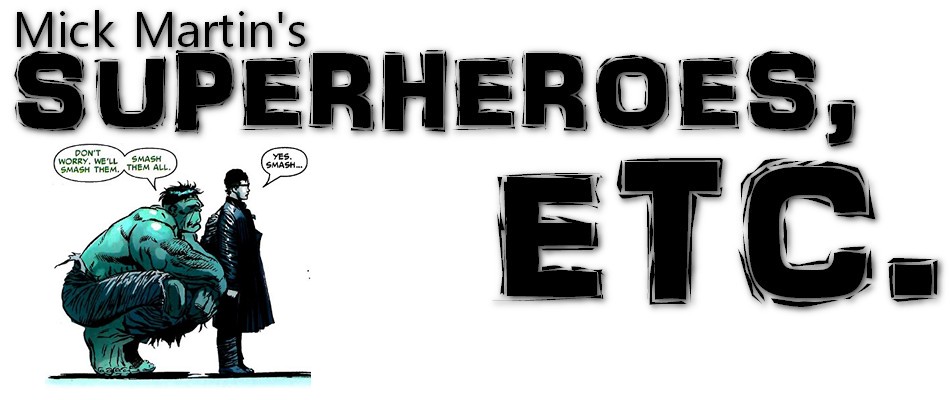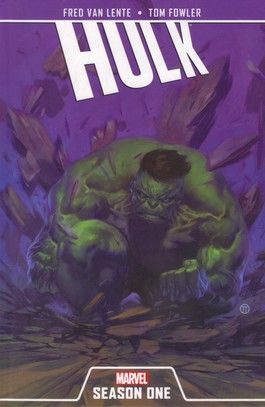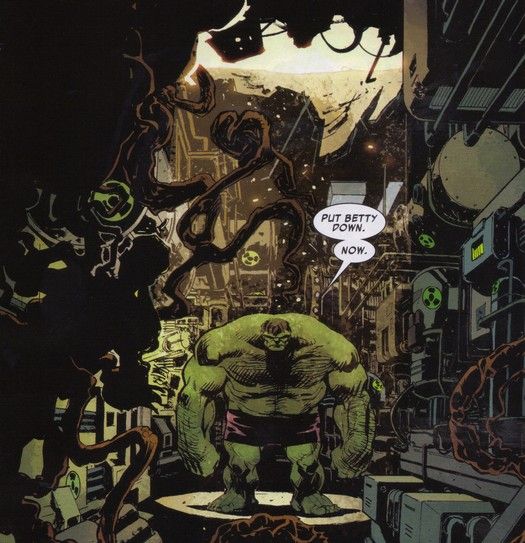Hulk: Season One
By Fred Van Lente and Tom Fowler
Published By Marvel; $24.99 US
136 pages
If you
know me and/or if you've ever been a regular reader of the blog, you probably
know Hulk is a favorite of mine. And if
you know that, then you might presume that any comic redefining the character's
origin as Hulk: Season One attempts,
will be met with some stubborn resistance on my part. I couldn't blame you for
that. I've been guilty of prejudging comics trying to mess with the who and
whats of my sacred super-cow's beginnings. I'd say, for example, I didn't
really give Brian Azzarello's Startling Stories:
Banner the chance it deserved. Though I still would argue that Paul
Jenkins's Mythos: Hulk was memorable
only for how forgettable it was and Jeph Loeb's Hulk: Gray was interesting only as a way of telling the story of
Hulk's origin from Betty Ross's point of view. But I swear I really did want to
like Hulk: Season One, if for no
other reason than it would have meant one of my first reviews upon returning to
blogging would be a positive one about a book chronicling the adventures of my
favorite funnybook hero. It just wasn't meant to be.
Though,
in a bit of a reversal of my usual way of going about things, I want to talk
about what I liked first.
I don't
know if I've ever seen Tom Fowler's work before, but I think I can officially
consider myself a fan. His style is not one I would normally associate with a
Hulk comic, and it's vibrant and refreshing. His Hulk manages to be ape-ish and
childlike at the same time, which goes along perfectly with the story Fred Van
Lente tells. Some of his Hulk drawings reminded me of Eric Powell's Goon, and
some actually put me in mind of Sam Kieth's brief work on the Hulk in Incredible Hulk #368 and later in the Wolverine/Hulk mini. In particular, I
love one specific panel toward the end, when Hulk looks like an angry little
fat kid in swim trunks, but still manages to be menacing.
I enjoyed many of the minor changes to the origin. I found it bizarrely satisfying that the gamma bomb explosion that
transforms Bruce Banner is set in one of the strange mannequin-filled replica
towns rather than the featureless expanse of desert in the classic origin. On one hand I like the weird unreality of it, and on the other it gives that piece of the story a bit more definition. I appreciated changing
Betty from the doe-eyed damsel of the original Lee/Kirby story to someone more
like Battlestar Galactica's Starbuck
(from the newer series, not the old; that would really be a redefinition of the origin story).
I'm a little
more neutral about other character changes. While the notion of Rick Jones
belonging to a drug-peddling gang leaves a bad taste in my mouth, admittedly it makes sense Rick might find himself in that kind of crowd at that point in his life. Though, speaking of another character important to Hulk's
beginnings, I'm disappointed that Glenn Talbot was nowhere to be found in Hulk: Season One.
It is
reassuring to a Hulk nut like myself that Van Lente proves he's done his
homework by pulling a lot from different corners of the Hulk's history. He
doesn't go very deeply into the abuse Banner suffered - an element of the
origin introduced by Bill Mantlo and greatly expanded upon by Peter David - but
it's clear that it's important not only to Banner, but to his alter ego's
existence. Monica Rappacini, first introduced during Peter David's brief return
to Incredible Hulk circa House of M, returns to find an integral
place in the origin. And something that I initially disliked but eventually
realized was a testament to Van Lente's knowledge of the character's history is
how the Hulk's dialogue changes drastically throughout the story. When he
fights the Gargoyle and his robotic minions, the Hulk sounds like his thuggish,
grayer self. Later when he fights the monstrous Biocide, he sounds more like
the classic savage HULK SMASH Hulk. But I soon realized that what I initially
saw as a discrepancy was actually intentional and, considering Banner's
fractured psyche, makes perfect sense.
One thing
that always rubs me wrong about stories like this are the "updates"
to the dialogue and the culture in general so that Marvel can show younger
readers that they're With It you know, daddy-o? They're not like the squares! I
see the need for it. Even though I cringe when I read Rick Jones saying,
"Ain't no thing, Scummy, just how I roll, youknowwhatI'msayin'" I
still know there's a reason for it. It's just that the execution is always so
clumsy and obvious. My least favorite part of the book comes right after the Hulk
crashes into an alleyway and surprises some gangbangers. One of the bangers
yells, "WHAT IS IT? IS IT PO-PO?" Really, dude? You think the giant
green half-naked thing that came crashing out of the fucking sky is a member of
the El Paso police department?
But that's
a relatively minor gripe. What leaves me more concerned is how busy the story
is. There's too many villains, too many random and unconnected elements, and
very little actual redefining. There's the Gargoyle and his robots who
apparently work for the Russian mafia rather than the Soviets. There's the strange science group Them (who
are clearly A.I.M., so why the hell aren't they just A.I.M. instead of Them?)
and their stockpile of bald kiddy clones. There's the manipulative temptress
Rappaccini and the junkie douchebag Special Agent Derek Halperin who eventually
transforms into the gamma-eating Biocide. The story would've been better served
with one major villain rather than enough villains to make Sam Raimi laugh and
say "What do you mean 3 in one movie is too many?"
Part of
the problem with the plot is perhaps my biggest disappointment with the story.
Unfortunately, mentioning it would spoil it, so let's just say the book ends
with Banner coming to a fairly huge decision, and I don't think Hulk: Season One ever comes close to
showing us why Banner would make such a choice. It's something he eventually
came to in the comics regardless of this new origin, but it was something that
took years. And it was something that should
take years. If there was anything in Hulk:
Season One to convince me he could reach such a drastic change in outlook
so quickly, I missed it.
Regardless,
Hulk: Season One won't ruin my
enjoyment of the character. Is it the official history of the character now and
forever? Sure. Just like that last three were. And in a year or two there will be a new official history of the
character now and forever. Who cares?



2 comments:
Just picked this up - was wondering if it's going to be good... this doesn't make it sound promising! But that's alright - nice review!
Hey Mick:
I know Tom Fowler, and let him know how enthused you were about his art, when I saw him at the speculative fiction conference in Ottawa a ways back. He was happy to hear it, although he admitted he wouldn't be staying on the book much longer because of shifting priorities.
Post a Comment